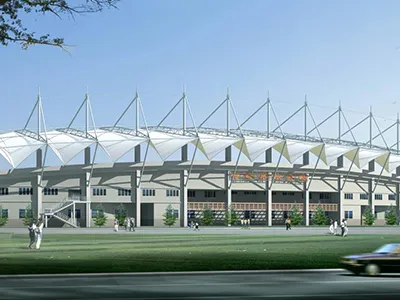Why are trusses so efficient over long spans?
Feb. 04, 2024
Trusses are renowned for their efficiency over long spans due to a combination of structural and economic advantages. Here are several key reasons why trusses excel in providing support over extended distances:
Load Distribution:
Trusses efficiently distribute loads across their members. The triangular configuration of the truss elements allows for optimal load-sharing, preventing concentrated stresses at specific points. This structural design is particularly effective in handling both live loads (such as people or equipment) and dead loads (the weight of the structure itself).
Material Efficiency:
Large Span Trusses use materials efficiently by placing them strategically in areas where they are most needed for load-bearing purposes. This minimizes the overall amount of material required, making truss structures lightweight while maintaining strength and stability. This efficiency becomes crucial over long spans where minimizing the weight of the structure is essential.
Span-to-Depth Ratio:
Trusses often have a high span-to-depth ratio, meaning the distance between the top and bottom chords is relatively large compared to the overall span. This ratio enhances the structural efficiency of the truss by optimizing its depth to efficiently resist bending moments, resulting in a slender and lightweight configuration ideal for long spans.

Economic Considerations:
Trusses are economically advantageous, especially when spanning long distances. The use of less material, faster construction times, and the ability to prefabricate components off-site contribute to cost savings. Additionally, the reduced need for extensive foundation support and the potential for longer spans without the need for intermediate supports further enhance the economic viability of truss structures.
Customization and Versatility:
Trusses offer a high degree of customization to meet specific design requirements. Engineers can tailor the configuration of truss elements to accommodate various loads and span lengths. This versatility allows trusses to be adapted for specific applications, making them an efficient choice for a wide range of structural projects.
Ease of Construction:
Trusses are often prefabricated off-site, allowing for precision manufacturing and quick assembly on-site. The straightforward assembly process contributes to faster construction timelines, reducing labor costs and minimizing disruptions. This ease of construction is particularly beneficial when dealing with long-span structures, where efficiency and speed are crucial.
Aesthetics and Design Flexibility:
Trusses offer architects and designers a high level of flexibility in creating aesthetically pleasing structures. The open framework of trusses allows for unique and visually appealing designs, making them suitable for a variety of architectural styles. This flexibility in design contributes to the widespread use of trusses in both practical and aesthetic applications over long spans.
Maintenance and Durability:
Truss structures are generally durable and require minimal maintenance over their lifespan. The efficient load distribution and optimized use of materials contribute to the longevity of truss systems. Their ability to withstand environmental factors and structural stresses makes them a reliable choice for long-span applications.
In summary, trusses are efficient over long spans due to their ability to distribute loads effectively, use materials efficiently, provide economic advantages, offer customization, facilitate ease of construction, allow for versatile designs, and ensure durability with minimal maintenance requirements. These factors collectively make trusses a preferred structural solution for a wide range of applications requiring support over extended distances.
439
0
0
Next: None


Comments
All Comments (0)